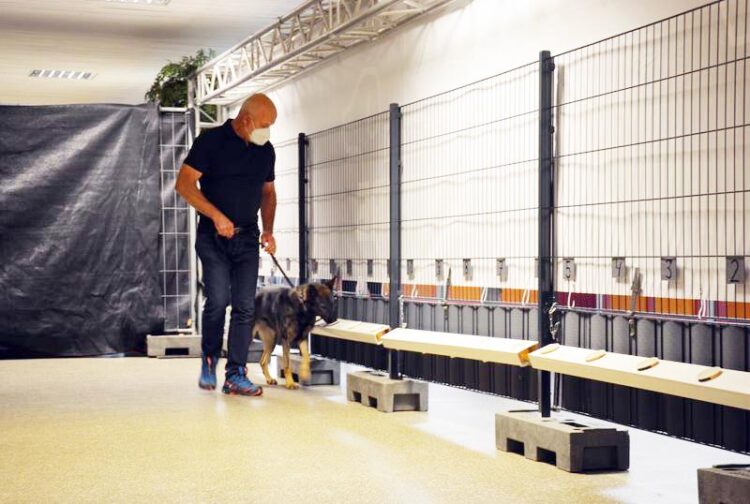Corona sniffer dogs’ real-life feasibility study was successful

Back to culture - Corona sniffer dogs’ real-life feasibility study was successful
(c) Sonja von Brethorst
Back to culture –
Research led by University of Veterinary Medicine Hannover (TiHo), in cooperation with Hannover Medical School (MHH), Robert Koch Institute, Hannover Concerts, ProEvent Hannover and AWiAS Aviation Services GmbH, examined whether trained corona detection dogs can be used in everyday life. For the first of its kind study, the project team held four concerts at the end of 2021, at which the medical detection dogs sniffed sweat samples from all visitors at the entrance to detect SARS-CoV-2 infections. The research team published their results today in the BMJ Global Health.
The Lower Saxony Ministry for Science and Culture supported the study with around one million Euros. “I am delighted with the success of the ‘Back to Culture’ feasibility study,” said Lower Saxony’s Minister for Science and Culture, Falko Mohrs. “It shows that using dogs can be an option for infection control. This study is a further proof of Lower Saxony’s creativity and innovative strength.”
The overall rate of concordant results was almost 100 percent. Eight dogs had been trained in advance to recognize SARS-CoV-2-positive samples by smell. To evaluate how well the corona detection dogs’ performance of screening people for SARS-CoV-2 works in an everyday situation, the project team organized four concerts with Fury in the Slaughterhouse, Bosse, Alle Farben and Sido. A total of 2,802 participants came to the four events. They all provided sweat samples, which were presented to the dogs in a line-up scenario where the visitors had no direct contact with the dogs. In addition, all participants had been tested with a SARS-CoV-2-specific rapid antigen test and an RT-qPCR before the respective concert. They also provided information on age, gender, vaccination status and their medical history.
The SARS-CoV-2 detection dogs achieved a diagnostic specificity of 99.93 percent (detection of negative samples) and a sensitivity of 81.58 percent (detection of positive samples). The overall agreement rate was 99.68 percent. The majority of the participants had been vaccinated with different vaccines and vaccination schedules, several visitors suffered from chronic illnesses and were treated with chronic medication. This did not affect the decisions and working behaviour of the dogs.
Professor Holger Volk, head of the TiHo’s small animal clinic, said: “Our results show that SARS-CoV-2 detection dogs can achieve high diagnostic accuracy in a real-world scenario. Vaccination status, previous SARS-CoV-2 infection, chronic illness and medication of the participants had no impact on the dogs’ ability to detect an acute infection. The study also demonstrates how corona detection dogs can be used in everyday life.”
The project “Back to Culture”
As early as July 2020, a research team from the Clinic for Small Animals had shown in a pilot study that dogs, with their exceptional sense of smell, are able to distinguish between samples from SARS-CoV-2-infected and healthy people under laboratory conditions with around 94 percent certainty. A follow-up study showed that sweat and urine are also suitable sample materials. The aim of the joint project “Back to Culture” was to examine how and whether major events can be made safer by using corona detection dogs. The study results also provide a statement as to whether corona detection dogs could also be used in other everyday situations.
The original publication
ten Hagen NA, Twele F, Meller S, et al. Canine real-time detection of SARS-CoV-2 infections in the context of a mass screening event. BMJ Global Health 2022;0:e010276. https://doi.org/10.1136/bmjgh-2022-010276
Review article providing further details
Jendrny, P., Twele, F., Meller, S. et al. Canine olfactory detection and its relevance to medical detection. BMC Infect Dis (2021) https://doi.org/10.1186/s12879-021-06523-8
Wissenschaftliche Ansprechpartner:
Professor Dr. Holger Volk
Stiftung Tierärztliche Hochschule Hannover
Klinik für Kleintiere
Tel.: +49 511 953-6202
holger.volk@tiho-hannover.de
Originalpublikation:
https://doi.org/10.1136/bmjgh-2022-010276
Weitere Informationen:
Media Contact
All latest news from the category: Studies and Analyses
innovations-report maintains a wealth of in-depth studies and analyses from a variety of subject areas including business and finance, medicine and pharmacology, ecology and the environment, energy, communications and media, transportation, work, family and leisure.
Newest articles
Faster, more energy-efficient way to manufacture an industrially important chemical
Zirconium combined with silicon nitride enhances the conversion of propane — present in natural gas — needed to create in-demand plastic, polypropylene. Polypropylene is a common type of plastic found…

Energy planning in Ghana as a role model for the world
Improving the resilience of energy systems in the Global South. What criteria should we use to better plan for resilient energy systems? How do socio-economic, technical and climate change related…

Artificial blood vessels could improve heart bypass outcomes
Artificial blood vessels could improve heart bypass outcomes. 3D-printed blood vessels, which closely mimic the properties of human veins, could transform the treatment of cardiovascular diseases. Strong, flexible, gel-like tubes…





















